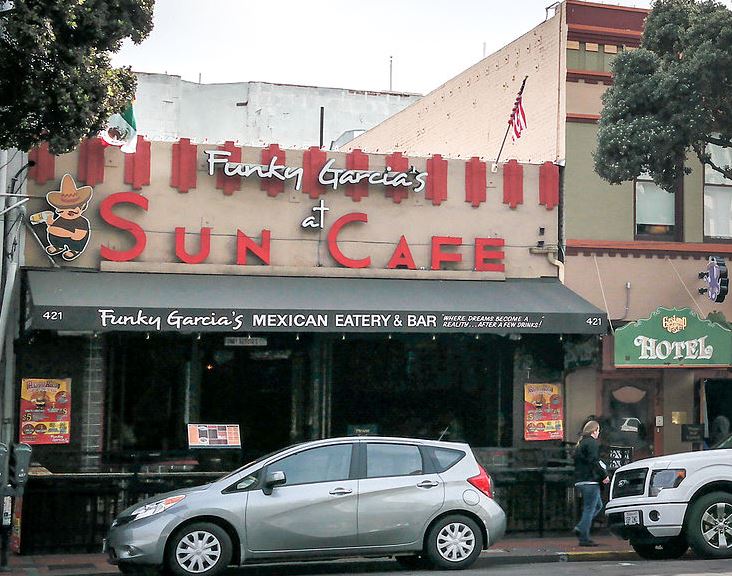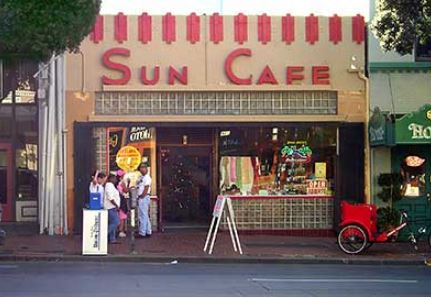By Abe Levine
(This is part of our ongoing series, Lost Kinjo- a look at the more than 40 Japanese communities that disappeared after World War II. It is supported by funding from the California Public Library Civil Liberties Project and the Takahashi Family Foundation.)
Downtown San Diego in the 1940s was home to a bustling Japanese business corridor. Japanese-owned restaurants, barbershops, and a midwifery thrived alongside several other Japanese American institutions. The area just south of Market St — a stretch of the waterfront once derided as a red-light district – proved fertile grounds for Asian American entrepreneurship, which also included Chinese and Filipino business ownership.
The first wave of Japanese immigrants to San Diego, Isseis, followed in the footsteps of the Chinese, filling roles in fish canneries and when granted licenses to fish, they bolstered the industry, patenting methods and tools such as two-man teams armed with flexible bamboo rods with steel hooks. Owning a small business, whether as a boat captain or a brick and mortar entrepreneur, provided a pathway out of low-wage labor.
Uichiro Obayashi established the Sun Café around 1912 on the edge of the Japanese American business corridor on 4th and Market St. Serving American fare and Chinese American comfort food, there was “something for everybody,” says Jon Obayashi, Unichiro’s grandson, now 84. He adds there was no Japanese cuisine on the menu, as Americans were yet to assimilate it.
Over the years, this bustling ethnic enclave was known by several names. In the late 19th century, Chinese Americans called it the Stingaree, a colloquial pronunciation of Sting Ray. They had established businesses there after fleeing anti-Chinese riots in the north. This area was also known for sin and vice, a place where docked sailors would come to “get stung” by dabbling in their pick of gambling, drinking, or prostitution. Diners at the Sun, including sailors and marines, could get anything from pork chops to chop suey and a stiff drink.
The elder Obayashi, handed the diner-restaurant over to his son Al (short for Alfred) in 1940. Shortly thereafter, President Roosevelt signed Executive Order 9066, authorizing the U.S. military to remove all persons deemed national security threats from the west coast. Some Japanese Americans left voluntarily, but military Proclamations No. 4 and No. 59 sanctioned the forced detainment of Japanese Americans living in San Diego. They were sent on trains to assembly centers and later to concentration camps, euphemistically called relocation centers.
Given mere days to abandon their homes, the Obayashi’s rushed to put all of their possessions into storage, leaving the Cafe in the hands of a White family. At this time, over two thousand Japanese Americans were living in San Diego. Most were young people under the age of 21, according to the 1940 census. Jon was only a one-year-old at the time.
While incarcerated in Poston, Arizona, Jon’s father Al was among a group of men granted leave to take up potato harvesting work with their families in Idaho. Plans to shut down Poston and resettle the incarcerated population began in 1943.
By January of 1945, the military ended its policy of excluding Japanese Americans from the West Coast, clearing the path for a return to California. Families were reluctant to leave Poston; they’d be starting their new lives with scant resources, unknown prospects for stability, and likely hostility from White Californians. Local publications stoked anti-Japanese sentiment, including The San Diego Daily warned that an “invasion force” was coming.
From Idaho, the Obayashi’s came home alongside other families liberated from Poston. They found the Sun Cafe run down and dilapidated but “did what they had to do,” to get it back up and running, Obayashi says. Al would go on to open a second eatery, the Miyako Restaurant. Due to its surging popularity with WWII GI’s seeking Japanese meals, it outgrew its initial location. The Obayashi’s were outliers.
Lacking the capital to restart their businesses, some formerly independent Japanese American entrepreneurs took up service jobs and worked as domestic help or as gardeners. By 1950, only a third of businesses owned by Nikkei -second generation Japanese Americans -were operating, compared to prewar times, and more families were moving to the suburbs.

The Obayashi’s kept the Sun running for over a decade before selling it to a Chinese family who kept it open for nearly fifty years before closing permanently in 2008. It was also listed in the Green Book as a safe place to dine for Black travelers. Jon says his family was grateful to return. “Everything was there. This was our home.”
AsAmNews is published by the non-profit, Asian American Media Inc. Please support our fundraisers. Purchase your tickets to a Night of Hilarity- a fun conversation with comedienne Jiaoying Summers and ABC7/KABC anchor David Ono to be held October 9 in Los Angeles.
Then join us for a stimulating conference about issues that divide the Asian American communities. Our fundraiser Common Ground and the dinner after will be held October 26 at UC Berkeley.
AsAmNews is partially supported by the Stop the Hate grant administered by the California State Library in partnership with the California Department of Social Services and the California Commission on Asian and Pacific Islander American Affairs. To report a hate incident or hate crime and get support, go to CA vs Hate.

